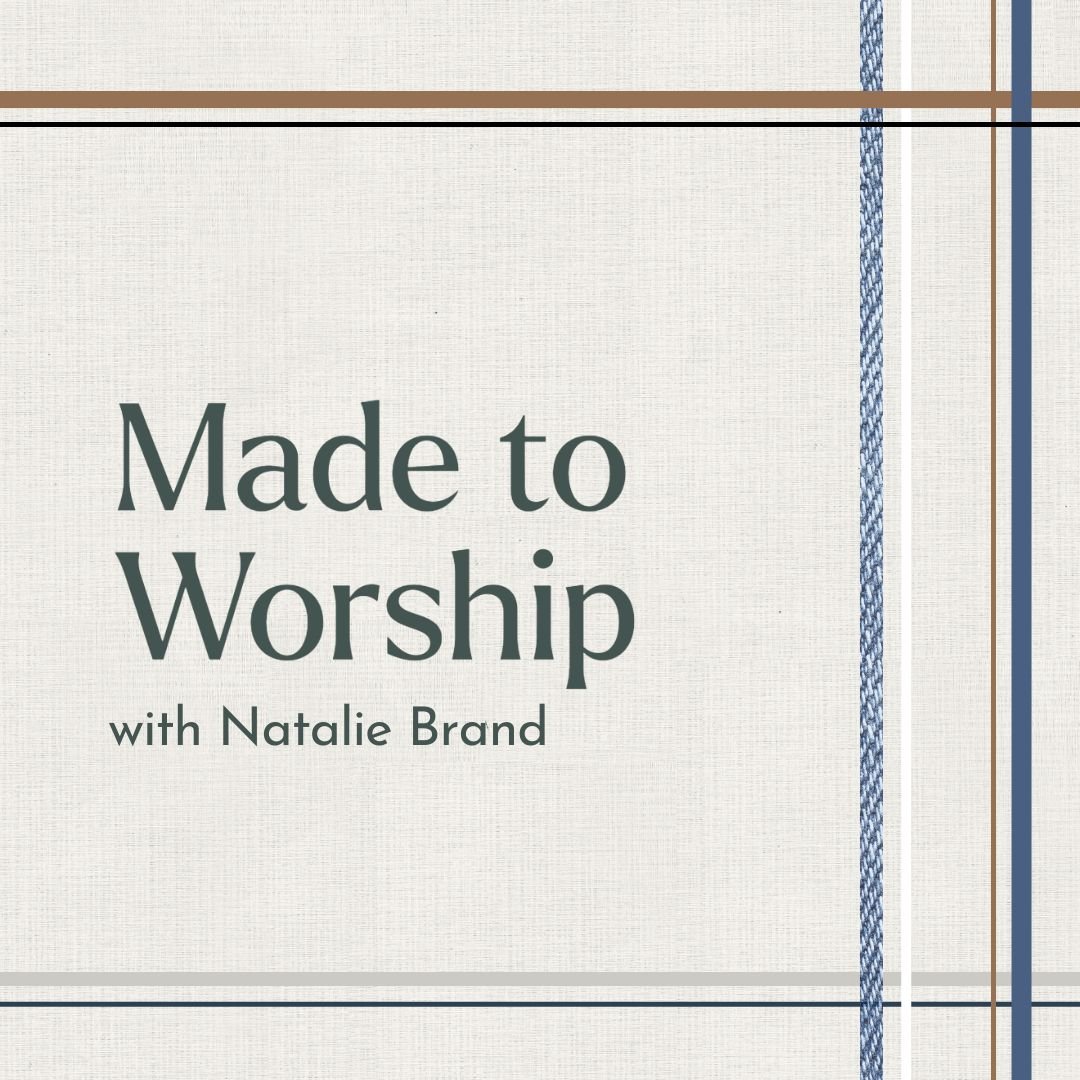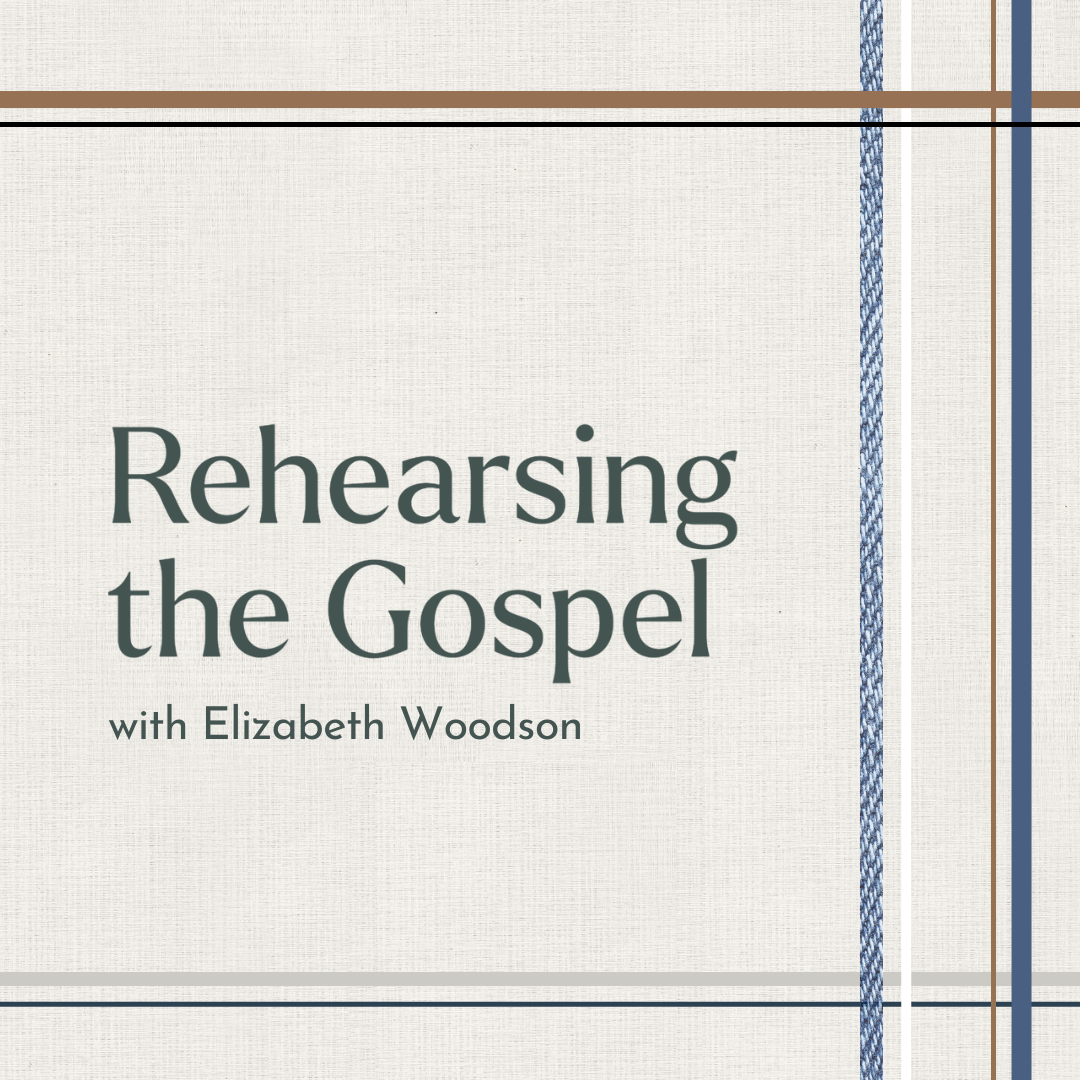Rehearsing the Gospel with Elizabeth Woodson
In this episode, Hunter is chatting with Elizabeth Woodson about the basics of the gospel and its application to everyday life. They explore the key elements of the gospel, including God's creation of man, humanity's fall into sin, Jesus' redemption, and the promised hope of consummation. This conversation is full of rich insights about the goodness of the gospel and what it means to love God and live out the gospel in all seasons of life. We hope it encourages you to more fully understand the gospel narrative of Scripture, to apply those truths to your own life, and to embrace the conviction, comfort, and transformed identity that the gospel brings!
INTERVIEW QUESTIONS
When do you remember hearing the gospel for the first time?
How did your understanding of the gospel narrative help you better understand who you were and what you were doing here?
What are the key elements of the gospel that we must understand?
How does the message of the gospel bring both conviction and hope?
Why is the gospel essential for Christians and non-Christians?
When did you realize you need the gospel every day, and how did that realization impact your walk with God?
How do you apply the gospel to various hardships in your life? How do you "preach the gospel" to yourself?
How does seeing the gospel as the climax of Scripture change the way you read your Bible?
How does meditating on the gospel help us slay sin and embrace humility?
How does meditating on the gospel help us rest in Christ's righteousness?
Who has had the greatest impact on your understanding of the gospel?
NOTES & QUOTES
“The gospel—yes—is about our individual salvation, but the gospel is also about this corporate element of the redemption and restoration that God is doing in the world. He didn’t just come to save you and I individually; he came to save this entire world.”
“We see the idea of ‘shalom’ at the very beginning of the biblical narrative; the idea of wholeness, where everything is as it ought to be. We see this unravel because of sin in the world, and then through Jesus and to the end of the Bible we see that ‘shalom’ return.”
“The good news is the King has come; the good news is that the Messiah is here and salvation is found through him.”
“Salvation does ensure our eternal destiny; but it also means something for the here and now as well.”
“My life only makes sense when it is connected to the Lord.”
“Who I am only makes sense when it is connected to who God says I should be.”
“The gospel both calls us higher and connects us to the source (God himself).”
“God created us to be in relationship with him. We sinned and broke that relationship. Jesus is the only one who could overcome that. And through faith in him the relationship is restored both for now and for eternity.”
Insight #1—Lauren Bowerman
“God’s Word clearly reveals the glorious truth of Christ, and it is there that we can go to be reminded of the richness and goodness of the gospel message.
I wouldn’t be me if I didn’t remind us all of my favorite gospel passage in all of Scripture: Ephesians 2. If you want to rehearse and remember the gospel, I’d encourage you to memorize this passage. It will take time and effort, but it is doable and it is worth it!
Paul tells believers in Ephesians 2 that we were dead our trespasses and in the sins in which we once walked, that we were children of wrath. “But God, being rich in mercy, because of the great love with which he loved us, even when we were dead in our trespasses, made us alive together with Christ—by grace you have been saved— and raised us up with him and seated us with him in the heavenly places in Christ Jesus, so that in the coming ages he might show the immeasurable riches of his grace in kindness toward us in Christ Jesus. For by grace, you have been saved through faith. And this is not your own doing; it is the gift of God, not a result of works, so that no one may boast. For we are his workmanship, created in Christ Jesus for good works, which God prepared beforehand, that we should walk in them.
This, friends, is the gospel. It’s the truth that we were far from God, having sinned and fallen short of his glory, as Romans 3:23 says, but that we are “justified by his grace as a gift, through the redemption that is in Christ Jesus.” It’s the fact that “while we were still sinners, Christ died for us” (Rom. 5:8). It’s the news that we were dead [dead!] in our trespasses, but that God made us alive together with Christ, forgiving our sins and canceling our record of debt, nailing it to the cross, as Colossians 2:13-14 says.
The gospel is the glorious truth that, out of his great love, the Son of God was “pierced for our transgressions; he was crushed for our iniquities; upon him was the chastisement that brought us peace, and with his wounds we are healed” (Isa. 53:5). It is the reminder that now, having been saved by his blood, we are continually “being justified by his grace we might become heirs according to the hope of eternal life” (Titus 3:7).
It’s the news that Christ “himself bore our sins in his body… so that we might die to sin and live for righteousness;” it’s the truth that he healed us by the very wounds he bore (1 Peter 2:24).
This friends, is the truth of the gospel as revealed in the Scriptures. May you dwell on it today, and may you find yourself continually changed by it.”
“The gospel lets us know that our best life is in connection with the living God. That means we live life on his terms.”
“God is working in my life for my good.”
“God shows up in our life not because of us but because of Christ. It is his righteousness that enables the blessings to flow.”
“The gospel is the most amazing news that brings us the shalom we long for.”
“I often come back to the character of God—both in who calls me to be and who I’m called to reflect but also what I can expect from God in the seasons where I feel he’s forgotten me and to remember that God is always working, that he works on behalf of his children, that his goodness continues to flow.”
“If the things I long for don’t show up in my lifetime, where do I put my hope, where do I put my trust, where do I find joy? In those things, preaching the gospel to myself is reminding myself that the joy comes from the Lord and that goodness still flows in my life even if it’s not where I would desire it, even in that space of longing.”
“Rehearsing what is true about God and what is true about myself has been how I rehearse the gospel to myself in moments when I need it the most. It bolsters me up on days when it’s hard for me to stand up straight.”
Insight #2—Lauren Bowerman
“I don’t know about you, but I resonate deeply with what Elizabeth just shared. For me, in moments of deepest darkness, longing, or loss, the only thing that sustains me is the truth of who God is. His character as revealed in Scripture carries me and uplifts me, reminding me of what is true. So who exactly does the Bible say that is God, and what is his heart toward us?
God’s heart toward us in Christ is deeply kind; Ephesians 2:6-7 says that God has shown us “the immeasurable riches of his grace in kindness toward us in Christ Jesus” and Psalm 145:17 says he is “kind in all his works.”
Our God is a god of abounding grace and love. We see this truth all throughout Scripture, and over and overa again in the Psalms (Psalm 86:15, Psalm 116:5, Psalm 145:8). From his heart flows grace (Num. 6:25-26), and his love is steadfast and unfailing in his love (1 Chron. 16:34). Jeremiah says that God “loved you with an everlasting love” (Jer. 31:3). He has loved you enough to give you himself (John 3:16), and there is truly nothing in this world that can separate you from his love (Rom. 8:38-39).
God—at his very core—is good. Scripture says of him, “you are good and you do good” (Psalm 119:68). He can only act in goodness to us (even when it might not seem so).
God is near to us—always. He promises, over and over again in Scripture “I am with you”, “I am with you”, “I am with you.” In Isaiah 41:9 he promises us “I have chosen you and not cast you off.” This is true both in times of ease and in times of hardship. God draws near to us in our hurt, promising to heal the brokenhearted and bind up their wounds (Psalm 147:3).
As you read God’s Word, ask yourself where you can see his character. Trace his heart through the pages of Scripture and see that he is immeasurably greater and kinder and more compassionate that you realize. And as you come to know him more, may you love him more.
“The hope that I have is that this world is not the end.”
“The gospel has never been thwarted; God’s movement through the world has never been stopped. He is immutable, which means he never changes, and if he decrees something it will come to pass. And he says that there is eternity awaiting us; this world is not all that there is.”
“Who is God? Who am I? And what does it mean for me to live in God’s world?”
“God sees women, he loves us in our brokenness, and he is present with us. How can I respond to that?”
“Who is God in this passage? What can I learn about him? How can I respond to this as a person who is called to love him with the entirety of my life?”
“The gospel reminds you that you need God; it reminds us that it’s not about us.”
“It’s impossible for us to live the life we’re called to without the Holy Spirit.”
“The goal of my life is not my own personal greatness, but the greatness of God.”
“Jesus plus anything and you nullify everything.”
DISCUSSION QUESTIONS
When do you remember hearing the gospel for the first time?
How would you describe the gospel to someone who had never heard it before?
How does the message of the gospel bring both conviction and hope?
How do you apply the gospel to various hardships in your life? How do you "preach the gospel" to yourself?
How does seeing the gospel as the climax of Scripture change the way you read your Bible?
RESOURCES
From Beginning to Forever by Elizabeth Woodson
Embrace Your Life by Elizabeth Woodson
A Gospel Primer for Christians by Milton Vincent
From Garden to Glory by Courtney Doctor
EPISODES IN OUR BACK TO THE BASICS SERIES
ARTICLES IN OUR BACK TO THE BASICS SERIES
IMPORTANT NOTE
Journeywomen interviews are intended to serve as a springboard for continued study in the context of your local church. While we carefully select guests each week, interviews do not imply Journeywomen's endorsement of all writings and positions of the interviewee or any other resources mentioned.
Affiliate links used are used where appropriate. Thank you for supporting the products that support Journeywomen!

















